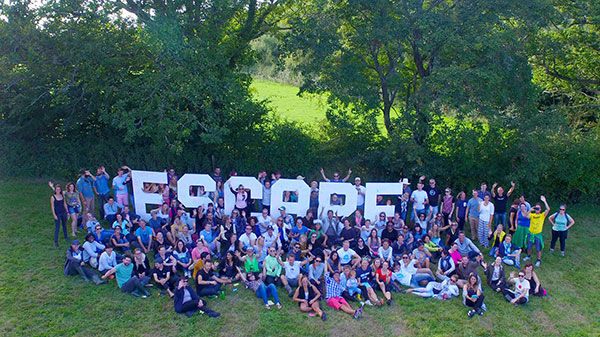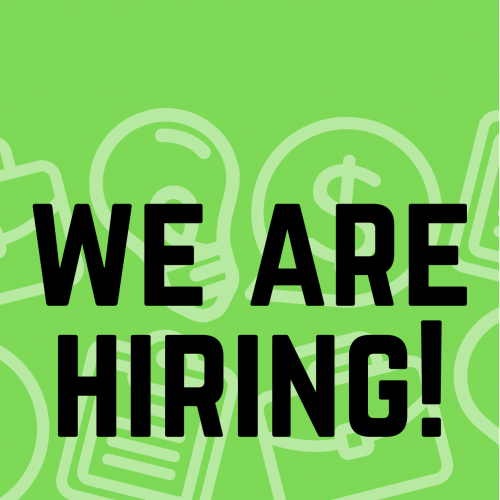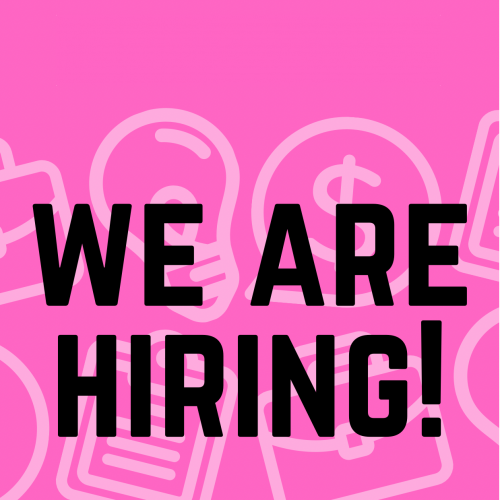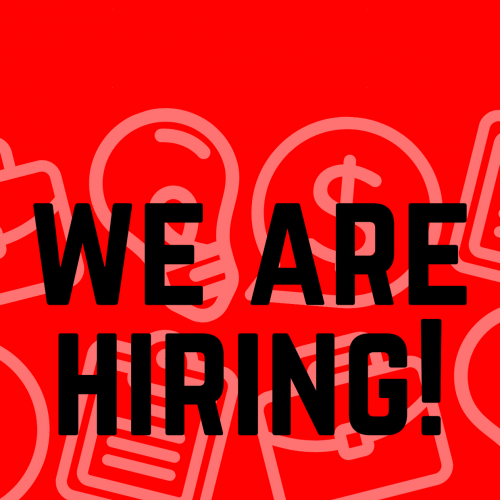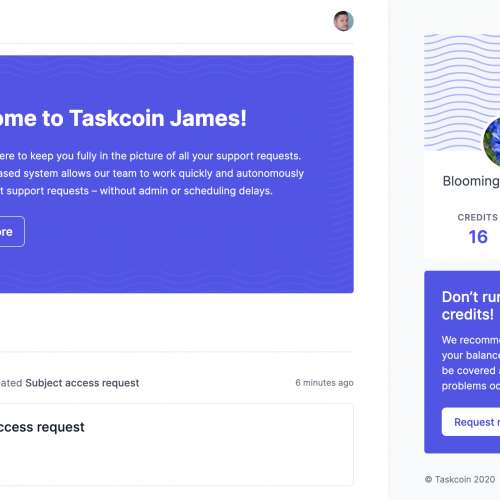Most entrepreneurs know that it’s easy to have an idea for a startup, but much harder to know for sure whether there is a consumer or audience large enough to make that startup a success.
For Mikey Howe, becoming a startup COO and Head of Product and building a global community wasn’t the first thing on his mind. Feeling stuck at his corporate banking job in London, Mikey and two friends and co-founders Dom Jackman and Rob Symington started Escape the City to fill the gap they found when struggling to search for a new role that satisfied their craving for adventure and purpose.
Escape the City now offers inspiration, opportunities and access to transformative career change programmes to its 400,000+ strong community.
Community first
Starting with a meetup group, Facebook group and blog, they began to gather others looking for that same something that would inspire them to get out of bed in the morning. It was a community at its heart, right from the very start.
Their events grew quickly, attracting inspiring speakers and hundreds of attendees, whilst their Facebook page began to fill with unique job opportunities around the world with charities, cool startups and even on remote islands. Before they knew it, they were hosting events for thousands globally and had begun to monetise ‘Escape the City’ through events, courses and a jobs board.
When it came to scaling Escape the City however, the team needed a substantial cash injection to hire developers and turn Escape the City into a fully fledged platform and business. Thanks to their evangelical community of thousands, they were able to fundraise £600,000 through CrowdCube after receiving pledges of several million from their then 65,000+ strong evangelical fan base.
What makes Escape the City different from other startups is that it didn’t startup as a startup, but what makes it a killer example to the early-stage businesses of today is its impressive growth through community building.
This year Mikey has moved on to work with us and our portfolio of startups as CEO of Simpleweb Studio One, so we thought we’d delve into some of his biggest and best learnings from running Escape the City that can be applied to any startup looking to grow fast, create value and build their own community of evangelists.
Alice: Looking back to the beginning, what was the turning point for you giving up your job to start Escape the City?
Mikey: I worked in a massive corporate office for one of the world’s largest banks. I found I was spending increasing amounts of time going to the bathroom so I could sit and read blogs and articles about people doing more fulfilling things with their careers. Stories of people making career changes, starting businesses and generally following their passions in some form. There’s only so many times you can go to the bathroom before people start to wonder what’s wrong with you. It was at that point I realised this was ridiculous and I just needed to be doing something else.
Alice: Escape the City started as a blog and snowballed from there. Almost 10 years later and the internet is arguably saturated with content. Is this still a viable way of getting your ideas out there?
The need for a startup to create valuable content to users isn’t going to go away
Mikey: I absolutely think it is. We didn’t realise this at the time, but when we started creating content for our users back in 2010 we didn’t really do it as a growth tactic. We didn’t even call it ‘content’. We were simply trying to solve our users problems in different ways, content being one of them. Because we focused on the problem and went deep into the fears and emotions of our users, we were able to deliver real value. The need for a startup to create valuable content to users isn’t going to go away. The format and the delivery mechanism might evolve, but the fundamentals of great storytelling and delivering value in an authentic way, will always be there.
Alice: When and why did you decide to turn Escape the City from a blog into a business?
Mikey: As we started to get traction through our blog, facebook group and newsletter, it became clear that we could get eyes onto the job listings we were sharing and ultimately deliver value to the employers in the form of candidates. In the early days we were sharing job listings without the end employer knowing we were doing it. They started to get in touch to either thank us, or ask whether they could share other listings with our community. That gave us the confidence to invest in building version one of the job board.
Alice: Would you start Escape the City differently if you started again right now?
Mikey: If we were starting again today the thing we would do differently would be how we would build the technology. In its simplest form Escape the City is a job board. Back in 2009 you couldn’t just buy a job board theme on WordPress for $80 or pay a low monthly fee to a third party job board provider.
There is always a way to know if you can deliver value to customers even before you have a product
Today we would leverage cheaper technologies as a starting point to get to a first version of the product and then build a custom solution only if it made sense for how we need to solve our users problems (once we’d tested the concept and got some traction).
Alice: What are the most important things you learnt about developing a startup/ product, particularly in the early stages?
Mikey: We tested the concept for Escape the City without building any technology. I don’t think we really planned this, but we were delivering value to our community of users, without ever having to spend anything on the tech. This helped us with three important things:
- we knew we could deliver value to candidates
- we knew we could deliver value to employers
- we had built a strong core audience
One and two gave us the confidence to invest in building a platform that would better deliver value to both sides of our marketplace and three meant that once we built it, we had an audience to launch to. When we were ready to launch, we did it with a massive party in a club in London with inspiring speakers, live music, press and 800 of our first users.
Alice: Are there any mistakes you have learnt from your previous experience that you’d like to apply to your next venture?
Mikey: I think some of the biggest missed opportunities have been around getting the basics right. Simple team structures, clear repeatable processes, solid communication, alignment on strategy and a more collective effort to push the business forwards.
None of this is complicated, but you need the discipline to document and measure how your business works so that you can iterate and scale. Otherwise you end up chasing shiny things and every part of your business stays at version 1.0.
Alice: During your time at EtC, you and your team published ‘The Escape Manifesto’ which talks a lot about overcoming fears when leaving your job to start something new. What, out of these, would you recommend most to budding entrepreneurs or early-stage startup founders?
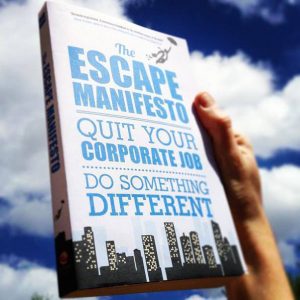 Mikey: One of the biggest fears for early-stage entrepreneurs is around money. How do I quit my job to start a business? How will I pay the bills?
Mikey: One of the biggest fears for early-stage entrepreneurs is around money. How do I quit my job to start a business? How will I pay the bills?
The answer is simply to not quit at first. Carve out time in your week that you dedicate to your new venture. Stick to that time and turn it into a habit. Then be smart about how you use that time to get your idea off the ground. Smart means getting your first customer as quickly as possible, without building any complex technology or spending any money. This is the step where people normally get stuck. They think everything needs to be perfect. That they need a perfect website or a fully formed product.
The people who think like entrepreneurs are normally the ones that become successful
‘What is the fastest way to make the biggest learnings?’ That’s the question founders should constantly ask themselves. There is always a way to know if you can deliver value to customers even before you have a product. Once you can deliver value, you should be able to turn that into a business.
Alice: You’ve worked with a fair few entrepreneurs and startups in the past as part of EtC too, what were the common features of the most successful ventures you’ve worked with?
Mikey: I think it almost always comes down to the attitude and mindset of the founders. The people who think like entrepreneurs are normally the ones that become successful. Not because the first thing they launched was a success, but because they had the right mindset to continually iterate and keep to the ‘build > measure > learn’ feedback loop. They’re also not afraid to share their idea with everyone and welcome feedback and insights from whoever they can get it from. People who have a fixed mindset or think they know best usually never get off the starting blocks.
Alice: Escape the City eventually turned into a global community of 400,000 people! Can you tell me some particular events or things you did that helped to build this community the most?
Mikey: There wasn’t one particular thing that built the community. Ultimately it comes down to delivering authentic value, consistently over a long period of time. But in the ecosystem of offline experiences that we ran, there were some interesting ones.
We ran an event in 22 cities around the world all on the same day and called it World Escape Day. Our members across the world could vote to have an Escape event in their city. Once a city got a certain number of votes, we would arrange an event in that city. We ended up having events in 22 cities around the world with some +3,000 attendees, all on the same day.
Alice: What’s the most important thing you’ve learnt so far in your move from Head of Product to CEO?
Mikey: The CEO role doesn’t feel unfamiliar to me. I obviously also worked incredibly closely with my business partner who played the CEO role, so there was plenty of overlap.
The interesting thing is really around stepping into a business with a completely different business model, historically a very different growth strategy and a different way of running processes and team structures.
If you’d like to discuss your startup or project, get in touch with Simpleweb today.
